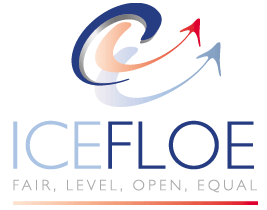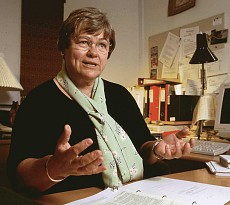|
|
Contents
ICEFLOE - The Equal Opportunities Forum of the
Institution of Civil Engineers
by Michelle McDowell
Women's Access to Land - FIG
Guidelines
Personalities: Bodil Dahl Ekner
Affirmative Action: Focus on College
Admissions
by Joanne L. Schweik
ICEFLOE
The Equal Opportunities Forum of the Institution of Civil Engineers
by Michelle McDowell, UK
The Institution of Civil Engineers (ICE) in the UK has
77,000 members; 3,700 of them are women. The Institution's Council debated
this disparity and established ICEFLOE, the Institution's equal
opportunities forum.
 |
ICEFLOE = ICE Fair, Level, Open, Equal
The remit of ICEFLOE is to promote equal opportunities, not
just for women, but for all. The membership of ICEFLOE is drawn from groups
which are under-represented in civil engineering, in particular women,
people from ethnic backgrounds, older people and the disabled. The
membership is constantly under review to reflect the issues of the day. All
members are practising engineers who understand the problems faced in our
profession and who are committed to making a change.
Our first task was to write our Equal Opportunities Policy
Statement. This really forms the core of all the work we do.
|
The Institution of Civil Engineers is committed to a
policy of equal opportunities.
We value the diversity and creative potential that men
and women with differing backgrounds, skills and abilities bring to the
Institution. We will endeavour to foster an environment free from harassment
and unfair discrimination in which individual potential can be cultivated,
so that everyone associated with the Institution can act against prejudice
with open and critical minds.
 |
It is our policy to
-
increase awareness of equal opportunities through
training, public forums and the media
-
research and reduce obstacles to equal opportunities
-
challenge and root out discrimination if it occurs
-
monitor and keep under review policies and practices
within the Institution to ensure the promotion of equal opportunities
This policy applies to members of all grades, employees
and applicants. The Institution also encourages its members to follow a
similar equal opportunities policy in their workplace. |
The Royal Institute of British Architects and the
Institution of Structural Engineers have already adopted this policy
statement as their own.
 |
Beverley Hughes MP launched ICEFLOE at the
Institution of Civil Engineers in June 2000. Senior figures in the
construction industry at tended the launch and contributed to the debate.
ICEFLOE received excellent publicity and was hailed as a major step forward
for the Institution of Civil Engineers. At the launch we set, somewhat
controversially, targets to double the number of women fellows in one year,
increase the representation of ethnic minorities on Council within three
years and see the first woman president of the Institution within ten years.
Since our launch we have already achieved several of our
goals.
We have set up a web-site, www.ice.org.uk/icefloe,
which offers a chat room and fact sheets on flexible working, age
discrimination and ethnic issues. The web site is a useful networking tool,
particularly since our membership is worldwide. |
In February 2001, we organised a reception to attract and
retain more women in the profession. Nick Raynsford MP, Minister for
Construction, spoke at the reception and gave government backing to our
initiatives.
 |
We unveiled a photographic exhibition called 'Real' at our
launch. The aim of the exhibition was to give exposure to engineers from
under-represented groups in our profession. Six engineers were photographed
in their workplace and each one made a statement about 'Real Careers, Real
Lives, Real People'. The exhibition is now touring the country.
|
We have achieved good publicity about our work in our
Institution magazine, New Civil Engineer and in other publications such as
Woman and Home. We are reaching out to our membership through our Local
Associations. Each Local Association has an ICEFLOE representative who has
been briefed and trained to assist with the individual member's problems.
In January 2001, we issued a questionnaire to all our
members to help us establish how many of them come from ethnic backgrounds.
We compiled the questionnaire using advice from the Home Office and will use
the results to establish our ethnic policy. We are already meeting with
minority ethnic groups and placing links to them on our web site.
 |
We have joined the Employers' Forum on Age, an expert group
which offers advice on age related issues. Many UK engineering companies are
currently experiencing a severe skills shortage. ICEFLOE has recognised that
one way to address this is to attract retired engineers back into work, on a
part-time basis if required. We are in the process of establishing a
database of retired engineers who want to work and will put them in touch
with employers who need to recruit. Retired engineers offer fantastic
business benefits to companies including low training costs and typically
very loyal service.
|
We have made changes to our Institution building in
Westminster to make it more accessible. Improvements include the
installation of hearing loops in the lecture theatres, a new reception desk
suitable for approach by people in wheelchairs, clearer signage and we are
currently commissioning ramp access, a challenge for a Grade 1 listed
building over 80 years old.
Most recently, we now have our first woman Vice-President in
over 180 years of the history of the Institution. We have already achieved a
40% increase in the number of senior women fellows and a greater
representation of women on Council.
When ICEFLOE was first launched, the task ahead seemed
insurmountable. However, we have found that by addressing issues one by one,
we have generated a momentum and an awareness way beyond our expectations.
We still have lots to do, but the real measure of our success will be when
we don't need ICEFLOE any more.
Michelle McDowell, BSc CEng FICE FConsE
Email: mj-mcdowell@bdp.co.uk
Chair of ICEFLOE, www.ice.org.uk/icefloe
Vice-President of the Institution of Civil Engineers, www.ice.org.uk
Director of Building Design Partnership Ltd., www.bdp.co.uk
Women's Access
to Land - FIG Guidelines
The FIG Publication No. 24 "Women's Access to Land -
FIG Guidelines" with Principles for Equitable Gender Inclusion in Land
Administration is now available on the following FIG web site: http://www.fig.net/figtree/pub/figpub/pub24/figpub24.htm

|
Bodil Dahl Ekner graduated in 1965 with
her MSc in Geodesy, Cadastral Science and Planning at the Royal
Veterinary Agricultural University in Copenhagen and began working
as Head of section with the Danish Directorate for Cadastre (now
Ministry of Housing, National Survey & Cadastre) and part time
with the Danish Directorate for Development, the division of Land
Consolidation. From 1968 to 1978 she became a part time teacher in
Land-Surveying at the Technical School for Building-Constructors and
was from 1969 to 84 Head of different sections in the Danish
Directorate for Cadastre. In 1969 she also became a chartered
Surveyor. Since 1974 Bodil has been officially appointed as an
External Examinator in Land Management and Agricultural Structure at
University of Aalborg and has been Head of division in the
Directorate for Food, Fisheries and Agro Business since 1984.
|
From 1980 to 1994 Bodil was member of the Board of
Chartered Surveyors and elected Vice-chairperson for 9 years and also
member of the Board of Surveyors working as Civil Servants and in other
Companies than Surveyor-companies from 1980 to 1991 including 6 years as
Chairperson.
Currently Bodil is Danish Delegate to FIG Commission 7
and member of the Consultative Committees for Forests and for Nature, the
Civil servants Consultative Committee for Spatial Planning, the advising
Committee for Planning and Outdoor Life at the Danish Forest and Landscape
Research Institute and the leading Boards in Centre for Countryside
Planning and in Margrethe Kogs Pumpelag.
Bodil Ekner's personal interests include swimming and
walking along the North Sea coastline. She is married and has two grown-up
sons.
Affirmative Action: Focus
on College Admissions
by Joanne L. Schweik, USA
(Reprinted by permission from Progress & Perspectives March-April
2001)
Much of the attention of United States citizens has been focused during
the last several months on the election of 2000 and the changing of the
guard in the White House and Congress. Far too many have also focussed
attention on such things as who will win on Survivor or Who Wants To Be a
Millionaire? Yet, one of our nation's most serious concerns -- ensuring
equal opportunity for all -- has had its share of attention as well.
In addition, its chief tool, affirmative action, has been quietly moving
forward on a bumpy roller coaster ride. In the forefront have been four
pending cases, all involving flagship universities in their respective
states. At the moment, according to an article by Sara Hebel in The
Chronicle of Higher Education, the four cases are vying to go to the
Supreme Court on appeal. Her article is entitled, "Courting a Place in
Legal History." At issue is the question of whether -- and how -- such
things as race and underrepresentation can be taken into consideration in
college admissions.
At the University of Georgia, three white women who had been denied
undergraduate admission charged that the school's admissions policies gave
preference to borderline applicants who were black. Those policies, said the
women, were therefore unconstitutional. Last July, a federal district-court
judge agreed. He ordered the women admitted, and ordered the university to
pay a total of more than $9200 to the women as compensation for expenses
involved with higher tuition at other schools. The university appealed the
case to the U.S. Court of Appeals for the 11th Circuit, but announced that
it would discontinue the controversial admissions practices while the
lawsuit was pending.
At the University of Michigan, two white undergraduate applicants who had
been denied admission to the College of Literature, Science, and Arts
charged the college with discrimination, again citing use of different
standards for black and Hispanic students compared with those for white
students. In December, a district court ruled in favor of the university,
which had argued, supported by many well-researched briefs by friends of the
court, that its policies were necessary to provide the desired climate of
diversity for its student body. A separate case has been brought by a white
female plaintiff, assisted by the Center for Individual Rights, a legal
advocacy group. The class action suit is against the university's law
school, once again charging that discriminatory practices were conducted for
admissions.
At the University of Texas, four white law school applicants who had been
rejected sued on the basis that the admissions policies used different
cutoff scores for white students and minority students. The suit charged
that this violated the plaintiffs' rights under the equal protection
provisions of the Fourteenth Amendment. In March 1996, the U.S. Court of
Appeals for the Fifth Circuit ruled that the law school was
unconstitutionally using race in denying admission to the four applicants.
In an additional and potentially historic ruling, the three judges declared
that the colleges in their circuit could no longer abide by the 1978 Supreme
Court decision known as Bakke, which had permitted admissions offices
to use race as one factor among many in making their decisions. In March,
1998, a less significant ruling against the university prompted the Board of
Regents of the Texas system to appeal, saying that the ruling enabled the
university to argue broader issues in the case; last June, the Fifth Circuit
heard arguments in the appeal and a ruling is expected sometime this year.
At the University of Washington, the Center for Individual Rights, on
behalf of a white applicant who had been denied admission in 1994, sued the
university's law school, arguing that the student's constitutional right to
equal protection had been violated because of different admissions standards
for white and minority students. Two rulings thus far in the case have
affirmed the validity of the Bakke decision and narrowed the scope of
the case. Last November, the U.S. Court of Appeals for the Ninth Circuit
heard arguments against those earlier rulings, and will rule, probably
sometime this year, on whether Bakke can still be used as the legal
affirmative action standard and whether some parts of the case have become
moot because of a state ballot initiative on whether the law school could
continue to use racial preferences.
All of these cases rest at least in part on the Supreme Court decision of
1978 more fully known as Regents of California v. Bakke. Here the
deciding opinion was written by Justice Lewis F. Powell, Jr., saying
that institutions could use race as a factor in admissions but could not set
aside specific numbers of places for members of minority groups. Among the
four cases, probably most attention is currently focused on the University
of Michigan cases, where President Bollinger has made a passionate,
committed, influential argument for diversity in the university environment
as necessary for true education.
Because of the school's commitment to diversity, and because of the
admissions practices used up to now, Michigan enjoys perhaps the best ratio
of minority enrollment of any of the nation's most prestigious institutions
of higher education. In this effort, Michigan, and other leading
universities, have for some time enjoyed the cooperation and support of
corporate America. Businesses, including Fortune 500 companies like Bank
One, Dow Chemical, Eli Lilly, General Mills, KPMG, Microsoft, Procter &
Gamble, and Texaco, under increasing pressure themselves because of a labor
shortage and the need to provide a workplace where diversity is the norm,
have turned to the nation's universities to provide the trained, diverse
people needed for the nation's future. They do this by contributing large
sums toward recruitment of minority students through scholarships, and by
supporting programs aimed at promoting scholastic success and diversity.
It makes sense. How can American society aim for, much less approach,
equality of opportunity and its corollary, successful integration into the
American dream, if its citizens are not educated for what is needed to
participate. It is here that all four universities and their respective
lawsuits take on absolute importance for our future. Which case will be the
first to make it to the Supreme Court remains to be seen. At the moment, the
University of Michigan seems to be in the lead. However, the eventual
decision of the high court also depends upon two other important factors: an
exploration of Bollinger's argument for diversity, and a close look at what
diversity is coming to mean in this country. It's not just blacks and whites
anymore. Increasing numbers of immigrants of all nationalities complicate
the picture. The question of who experiences discrimination, to what degree,
and for what reasons must be addressed, we would hope, before any Supreme
Court decision.
It is widely assumed that the current American president will determine the
outcome by those he appoints to the Supreme Court. John D. Skrentny,
author of The Ironies of Affirmative Action: Politics, Culture, and Justice
in America, advocates establishment of a new bipartisan presidential
commission to study these complexities and report to the nation how to deal
with them. Such a commission would, unlike what he calls the failed Clinton
commission on race, provide guidance for national and local
equal-opportunity policy.
[Editor's Note: Among other college admission issues that have been
raised by the debate over affirmative action are preferential legacy
admissions and preferential athletic admissions. Virtually all forms of
admissions review are now falling under intense scrutiny. Stay tuned as we
follow this subject over the next several months and years.]
Progress & Perspectives: an Affirmative Action for Surveying and
Mapping; Copyright 2001; Wendy J. Woodbury Straight; e-mail: wendy@netsync.net
|
Editor: Chair of the Task Force on Under-represented Groups in
Surveying
Ms. Gabriele Dasse, Kleinfeld 22a, D-21149 Hamburg,
Germany
Email g.dasse@gmx.de
Fax
+ 49 170 9620 453
web site: http://www.fig.net/figtree/tf/underrep/tfunrep.htm
2/01, month of issue: June
© Copyright 2001 Gabriele Dasse.
Permission is
granted to photocopy in limited quantity for educational
purposes.
Other requests
to photocopy or otherwise reproduce material in this newsletter should be
addressed to the Editor.
|
|





























